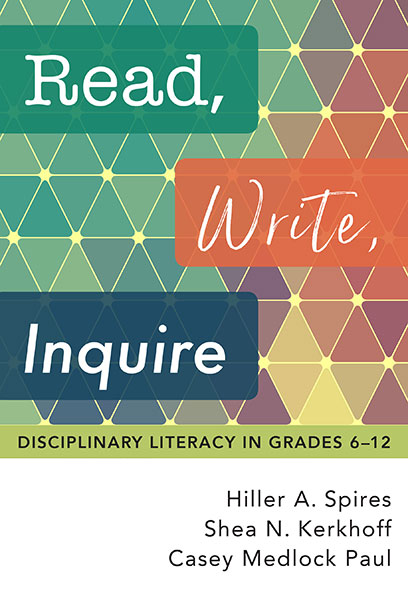Professors: Request an Exam Copy
Print copies available for US orders only. For orders outside the US, see our international distributors.
Hiller A. Spires, Shea N. Kerkhoff, Casey Medlock Paul
Publication Date: November 1, 2019
Pages: 168

In this practical guide, literacy experts show teachers how to use project-based inquiry to build students’ discipline-specific skills and knowledge in grades 6–12. The authors present a five-phase framework that incorporates their professional development experience working with over 3,000 teachers. By making the intuitive practices of the disciplines explicit within an inquiry process, students have opportunities to construct new knowledge by employing practices used by literary critics, scientists, historians, and mathematicians. Read, Write, Inquire responds to the current focus on disciplinary literacy across multiple sets of standards, offering a clear blueprint to help teachers meet these standards while also providing students with deep learning across the curriculum.
Book Features:
Hiller A. Spires is an alumni distinguished graduate professor at the College of Education and senior research fellow at the Friday Institute for Educational Innovation at North Carolina State University. Shea N. Kerkhoff is an assistant professor of secondary education at the University of Missouri–St. Louis. Casey Medlock Paul is a lecturer at the College of Education, North Carolina State University.
“Exceptionally well organized and presented, Read, Write, Inquire: Disciplinary Literacy in Grades 6-12 is an ideal choice for teacher in-service training programs and is unreservedly recommended for school district, college, and university library Teacher Education instructional reference collections and supplemental studies lists.”
—Midwest Book Review
”Individual teachers will surely benefit from this text, but department heads and curriculum designers will also find this a valuable resource for planning authentic and engaging curriculum with potential for crosscurricular collaboration.”
—Journal of Language and Literacy Education
“Spires, Kerkhoff, and Paul demonstrate disciplinary literacy in action while simultaneously providing guides to help teachers build their own lessons and units. To their credit, the authors assist readers in understanding the social underpinning of literacy practices and how these practices connect to larger societal issues. The text positions both teachers and students as learners and encourages them to be change agents by shifting the ways in which they approach teaching and learning. The practical applications and intentional focus on assisting teachers in thinking through how to use these tools make this book a useful resource for teachers who want to engage their students in deeper, more meaningful engagement with the content.”
—Teachers College Record
“This book masterfully situates disciplinary literacy within a project-based approach to student inquiry. This unique approach encourages students to adopt sophisticated literacy practices in the same way the disciplines developed them—as a natural outgrowth of knowledge creation.”
—Timothy Shanahan, distinguished professor emeritus, University of Illinois at Chicago
“Amidst the theorizing around disciplinary literacy, this book fills a critical gap by providing well-supported, clear, and extended practical demonstrations of disciplinary literacy in the four major content domains. It is an invaluable resource to teachers and teacher educators looking to take advantage of the power of inquiry learning in the disciplines.”
—William G. Brozo, Graduate School of Education, George Mason University
“Amidst the theorizing around disciplinary literacy, this book fills a critical gap by providing well-supported, clear, and extended practical demonstrations of disciplinary literacy in the four major content domains. It is an invaluable resource to teachers and teacher educators looking to take advantage of the power of inquiry learning in the disciplines.”
—William G. Brozo, Graduate School of Education, George Mason University
Contents
Acknowledgments ix
Introduction 1
Disciplinary Literacy and Project-Based Inquiry (PBI) 1
How Our Model Is Different from Other Methods 2
Benefits for Teachers and Students 3
Chapter Summaries 3
Design Features 5
1. Disciplinary Literacy and Inquiry for Deeper Learning 7
What Is Disciplinary Literacy? 7
What Is the Difference Between Disciplinary Literacy and Content Literacy? 11
Apprenticeship in Disciplinary Literacy 13
How Can Disciplinary Literacy Be Used with Inquiry-Based Learning? 18
Summary 21
Now It’s Your Turn! 21
2. Relating Disciplinary Literacy to Inquiry Through the Project-Based Inquiry (PBI) Model 22
The PBI Model 22
Summary 37
Now It’s Your Turn! 38
3. Gathering and Analyzing Sources: Getting Close to Close Reading 39
Gather and Analyze Online Sources 39
What Is Close Reading? 41
Close Reading in the Disciplines 42
Close Reading in the Classroom 48
Strategies for Close Reading 49
Summary 53
Now It’s Your Turn! 54
4. Creatively Synthesizing Information: Building Digital and Global Literacies 55
Creatively Synthesizing Information 56
Digital Literacies and Learning 57
PBI Global and Educational Cosmopolitanism 62
Summary 71
Now It’s Your Turn! 71
5. Critical Evaluation as Summative and Formative Assessment 72
Summative Assessment 73
Formative Assessment 76
Differentiation 79
Summary 84
Now It’s Your Turn 84
6. Share, Publish, and Act: Students and Teachers Stepping into Leadership 86
Students Share, Publish, and Act as Part of Their PBI Process 86
Teacher Leaders as Change Agents 87
Summary 95
Now It’s Your Turn! 96
Appendix A: PBI Disciplinary Literacy Lesson for ELA 98
Appendix B: PBI Disciplinary Literacy Lesson for Science 110
Appendix C: PBI Disciplinary Literacy Lesson for History 119
Appendix D: PBI Disciplinary Literacy Lesson for Mathematics 126
Appendix E: PBI Disciplinary Literacy Lesson Template 135
References 141
Index 149
About the Authors 158
Professors: Request an Exam Copy
Print copies available for US orders only. For orders outside the US, see our international distributors.